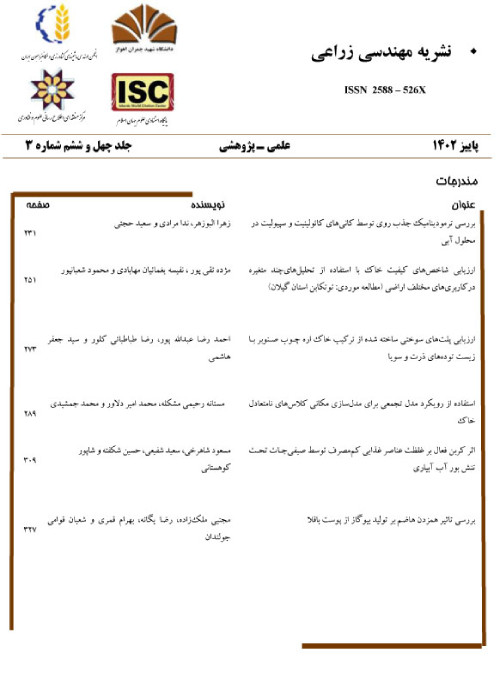The effect of magnetic water on the yield of corn and the adsorption of potassium, zinc and iron
Author(s):
Article Type:
Research/Original Article (دارای رتبه معتبر)
Abstract:
Introduction Increasing the yield and, consequently, increasing the concentration of macro and micro nutrients in the plant is one of the important aspects of agriculture. The improvement of the quality and quantity of some elements, such as potassium, zinc, and iron in the soil can cause an increase in the yield of the crop and the concentration of these elements in plant tissues. The increase in the concentration of these elements in plants can be effective in the health of livestock and consequently the health of humans. One of the new approaches that can be used in this field is the use of magnetic water. Magnetic water is obtained by passing water from a magnetic field. An externally applied magnetic field causes changes in the atomic, molecular, and electronic structure of the treated water, such as changes to its solidifying and boiling points, viscosity and the dielectric constant, the formation of clustering structures from linear and ring hydrogen-bound chains of molecules, the magnetic interaction between these clustering structures, and increasing the polarization effects of water molecules. The biological effects of magnetic field or electromagnetic field treatments depend on the strength and exposure period of water conditioning, in particular, the ion content, quality, and the volume of water. Materials and methods For this purpose, a field experiment was conducted in a factorial arrangement with two main treatments, adding and without adding potassium and zinc fertilizers, and five sub-treatments (magnetic field strengths, including a 0.4 Electromagnetic Coil (EC), 0.3 magnet, 0.3 EC, 0.1 EC, and the control treatment) in four replications at Research Station of Goran University of Agricultural and Natural Resources. The size of each experimental plot was 2 m × 2.5 m. Corn was planted in each plot with the distances of 15 cm from each other and rows with distances of 70 cm from each other. An electromagnetic coil and a permanent magnet were used to create a magnetic field. Water was passed from the middle of this magnetic field through a hose and the plots were irrigated with this magnetic water. The irrigation was conducted based on soil moisture content and continued until the harvest and drying of the plants. Soil and plant samples were taken at two flowering and harvesting stages and were transferred to the laboratory for analyzation. Concentrations of K, Zn, and Fe in the soil and plant tissues were measured. Statistical analysis was performed using the SAS software. Results The results of this study showed that all the plots that were irrigated by magnetic water had corn plants with greater height and more yield was obtained than the control treatments. This could be due to the ease of absorbing water from the soil. Magnetic water has lower surface tension than untreated water, so the plant needs less force to absorb water from soil particles. Also, the plants that were irrigated by magnetic water had higher concentrations (P <0.01) of elements, such as potassium, zinc, and iron in their grains. Magnetic water can increase the availability of the elements in the soil. So, more concentration of elements can be absorbed by the roots and transferred to the aerial parts of the plants. Among the magnetic water treatments, 0.4 Tesla strength treatment had the highest effect on the yield and corn height, as well as potassium, zinc, and iron concentration in grain (P <0.01). Higher strengths of the magnetic field (0.4 T) had more effect on the availability of elements in the soil and their absorption by the plants. The yield of corn in 0.4 EC, 0.3 M, 0.3 EC, and 0.1 EC treatments that potassium and zinc fertilizers were added to them increased as 164, 131, 107, and 45 percent, respectively, than the control. So, increasing the strength of the magnetic field had more effects on some soil properties. The treatments that K and Zn fertilizers were added to them had more yield than other treatments that these fertilizers were not added to them. This could be attributed to the fact that magnetic water has increased the solubility of K and Zn fertilizers. In fact, magnetic water has been able to increase the uptake of K and Zn from the soil. Conclusion These results indicate that the magnetization of water can be used as an appropriate approach to increase the quantity and quality of product yield and the concentration of the elements in the crops.
Language:
Persian
Published:
Journal of Agricultural Engineering, Volume:42 Issue: 2, 2019
Pages:
131 to 142
magiran.com/p2030331
دانلود و مطالعه متن این مقاله با یکی از روشهای زیر امکان پذیر است:
اشتراک شخصی
با عضویت و پرداخت آنلاین حق اشتراک یکساله به مبلغ 1,390,000ريال میتوانید 70 عنوان مطلب دانلود کنید!
اشتراک سازمانی
به کتابخانه دانشگاه یا محل کار خود پیشنهاد کنید تا اشتراک سازمانی این پایگاه را برای دسترسی نامحدود همه کاربران به متن مطالب تهیه نمایند!
توجه!
- حق عضویت دریافتی صرف حمایت از نشریات عضو و نگهداری، تکمیل و توسعه مگیران میشود.
- پرداخت حق اشتراک و دانلود مقالات اجازه بازنشر آن در سایر رسانههای چاپی و دیجیتال را به کاربر نمیدهد.
دسترسی سراسری کاربران دانشگاه پیام نور!
اعضای هیئت علمی و دانشجویان دانشگاه پیام نور در سراسر کشور، در صورت ثبت نام با ایمیل دانشگاهی، تا پایان فروردین ماه 1403 به مقالات سایت دسترسی خواهند داشت!
In order to view content subscription is required
Personal subscription
Subscribe magiran.com for 70 € euros via PayPal and download 70 articles during a year.
Organization subscription
Please contact us to subscribe your university or library for unlimited access!


